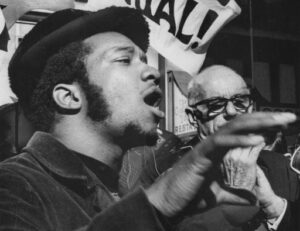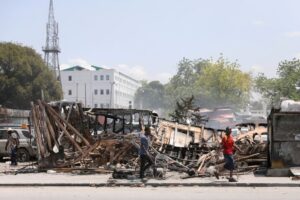INTRODUCTION
What began in October as a student protest over an increase in subway fares turned into a Chile-wide revolt of millions. On October 25, 1.5 million—in a country of 18 million—filled the main boulevards of Santiago, the capital, to demand a change in the political and social system inherited from the 1973-1990 period of military dictatorship.
For much of the last 20 years, world business and political leaders have touted Chile as an example of prosperity brought through “free market” policies. For most of that time since the end of the dictatorship, a coalition of center-left and centrist governments (the “Concertación”) has presided over neoliberal policies of privatization of social and educational policy. The result has been a country where precarious work, mortgage and education debt and retirement insecurity has immiserated millions of working-class people. Amidst the “Chilean miracle,” about 20 percent of the population lives in poverty.
The constitution approved as part of the transition from the dictatorship enshrined many anti-democratic provisions that allow for the suspension of civil liberties during emergencies and limit the parliament’s ability to enact social reforms.
Because of economic and political inequality, Chile has experienced mass explosions of protests before the recent one. In 2006 and again in 2012, high school and college students erupted in mass protests against the privatization and costs of education. The 2006 student revolt, called the “Penguin Revolution,” because its chief actors were high school students in their black and white uniforms, pressured the government of former President Michele Bachelet to implement some reforms to the education system. In 2018, thousands of women protested against gender violence and anti-LGBTQ discrimination and for the right to abortion.
The right-wing government of Sebastián Piñera has unleashed massive repression that has killed more than 20 people, injured more than 2,500 and blinded (with pellets fired at eye-level) more than 200. While the executive is meting out repression, the Chilean parliament approved a plan to call a constituent assembly to write a new constitution, with the goal of submitting it to a national plebiscite by April, 2020. Meanwhile, tens of thousands of Chileans continue to meet in popular assemblies (called “cabildos”) to articulate demand on multiple topics.
The article translated below, originally published at http://www.charquican.cl/charquican/20191115lacallenohafirmado.pdf, reflects an opinion on the current state of affairs from a long-time socialist activist, Igor Goicovic Donoso, who is a professor of history at the Universidad de Santiago de Chile. He is author of numerous books including a history of the revolutionary organization Movimiento de Izquierda Revolucionaria (MIR).
…………………………………………………………………………………………….
Many have understood that the agreements reached in the Chilean Parliament in the early hours of November 15 amount to a betrayal of the people and their mobilizations. But this judgment is wrong. The honorable parliamentarians have been consistent in following the mandate the ruling classes gave them (not for nothing does the ruling class finance their campaigns!). They have provided continuity to the political regime inherited from the dictatorship and reaffirmed by the successive civilian governments. Indeed, after the massive and radical popular mobilization of November 12, the U.S. government, the business community, the leadership of the Armed Forces and the hierarchy of the Catholic Church expressed to the government and the political caste (in different tones and with various arguments) the need to definitively contain the popular uprising.
The mandate was clear: it was necessary to close ranks to prevent the fall of the government and, along with it, that of parliament and the political system as a whole. It is not surprising, therefore, that despite their inevitable differences—from the right-wing Independent Democratic Union (UDI) to the left- of-center Broad Front (Frente Amplio)—they have announced reaching an “historic agreement” (they are going to repeat this nonsense until we’re all sick of it), to change the political constitution of the state. But they have kept the requirement of a two-thirds quorum of constituents while allowing the formation of the convention with representatives coming from the same political parties that have administered the system of domination to date. In fact, the required quorum that will form part of the new constitution is exactly the same as one that the same front men for capital would have produced.
There is no betrayal in this; on the contrary, it makes perfect sense. Moreover, in the coming months, we can expect that these initial agreements will be translated into permanent agreements that will strengthen the government’s repressive strategy, make the social agenda subordinate to the requirements of reviving the economy and reduce as much as possible popular participation in an eventual constitutional convention.
Thus, the problem does not lie in those who represent or who defend the system, much less in the percentages or quorums in which that domination is expressed. The problem lies among those of us who are mobilizing in the streets to carry out the deep transformations that society demands and for which many have already given their lives, while others have been arrested, tortured, raped, mutilated or harassed. It is therefore necessary to bring the debate on our political project into the territorial and interest group assemblies, and to debate strategies of struggle with respect to our forms of organization. This is the only way to achieve autonomously those objectives that the people have forged in the streets through their mobilizations and passionately expressed on their placards.
It is not enough to march hundreds of kilometers, as we have done to date; it is not even enough to violently confront repression or to recover from supermarkets and pharmacies those resources that capital denies us. These demonstrations have been, to date, only the expression of the population’s state of mind (discontent, anger, repudiation). As such, they have not become a strategy of accumulation of social and political forces for change. On the contrary, they are in danger of turning themselves into rituals and, in doing so, run the risk, in the short term, of wearing themselves out.
Since 2006 (during the “Penguin Revolution,” mass protests for education reform led by the “penguins,” a colloquial description of high school students in their black and white uniforms) the People’s Program has been fine-tuned. It is an anti-capitalist program that demands the nationalization of basic wealth and banking, workers’ control over production, a true redistribution of wealth, protection of the environment and a growing investment of public resources in education, health, pensions and housing. These elements have appeared systematically in the mobilizations of independent contract workers, forest service workers, fishing and port workers, but also in the demands of the regional movements (those in Aisén, Calama, Freirina, Punta Arenas, Caimanes), in the student mobilizations and in multiple sectoral expressions.
But there will be no People’s Program if popular social and political organizations do not advance decisively toward the realization of a Grand Peoples’ Constituent Assembly that places at the center of discussion and institutional redesign the construction of a society founded on solidaristic economic and social relations. These are the same relations that emerge in the context of crises, when the State abandons the people, who then must organize and govern themselves to arrive at solutions that allow them to resist and survive. Solidarity is at the foundation of popular culture, comes before the State and its social legislation, and has been the strategy that has helped the poor the most in precarious conditions. It is therefore time to turn it into an organizing principle for the constitutional order.
We have historical experiences that demonstrate this. We must review them, not in order to replicate them, but to learn from their successes and also from their defeats. The constituent assembly of wage earners and intellectuals, held in Santiago at the beginning of March 1925, and promoted by the Communist Party and the Workers’ Federation of Chile, established the bases of a federal political regime and championed the social and political rights of workers, women and children during the crisis of the oligarchic regime. Forty-five years later, the experience of Popular Unity and, in particular, the construction of popular power in industrial centers (cordones industriales) and working-class neighborhoods (movimientos barriales), opened the way to a revolutionary alternative, within the framework of the crisis of bourgeois society.
Both experiences were defeated. And when the bourgeoisie had retaken the strategic initiative, the armed forces joined in, neutralizing reformism and crushing the revolutionaries. Today the bourgeoisie and its representatives found the oxygen they needed in parliament, and they are preparing to take the strategic initiative again. From their spurious agreements, we can expect nothing new and nothing good, and the reasons are clear. These who invite us to join their “historic agreement” are the same people who, until four weeks ago, were unaware that inequalities existed in Chile. They are the same people who handed over national wealth to transnational capital. They are the same ones who refused to raise workers’ salaries or retirees’ pensions. They are the same people who profited from the privatization of health care, pensions and education. They are the same ones who deploy their repressive apparatus when they feel the anger of the people deployed in the streets. Only a popular constituent assembly, summoned, organized and led by the workers and the people, can guarantee the achievement of our objectives and the construction of a society of genuine democracy and solidarity.
In these four weeks of popular struggle there have been many advances and lessons learned. One of the earliest and most widely repeated slogans says: “Chile woke up.” It will no longer be possible to put the people back to sleep. Neither the most brutal repression, nor the systematic disinformation, nor the attempts to fracture us, nor their last-minute offers, have managed to placate popular protest. The people meet, debate, organize and fight. The people recognize the conditions they’re living in. They clearly identify those responsible for them and create demands and strategies for transformation.
An awakened people advances with determination towards increasing levels of organization. An expression of this is the human rights committees that accompany demonstrations, identify detainees, organize legal aid, file lawsuits and finger the repressors. There are also the health committees that have set up genuine field hospitals to care for comrades injured during demonstrations and to distribute information and resources to fight back against the repression’s chemical weapons. There are the artistic and cultural groups that create and recreate an aesthetic deeply committed to the people and to necessary changes. There are the logistics collectives that provide water and food to the demonstrators. And there are those who fight against repression, those who defend territories, those who protect the demonstrations, those who, with their radicalism, have opened the way to protest that has helped to confront the miseries of the current system.
But let’s not be distracted. This group does not include the criminals who assaulted small merchants or who steal from schools in our neighborhoods. This fringe group is, without a doubt, a by-product of the system, and at the same time, functional to it. For them, protesting is “dumb” and they don’t hesitate to take advantage of it the opportunity allows them. In Central America and Colombia, during the height of the armed struggle against the bourgeoisie, crime became an assassin at the service of the armed apparatuses of the State. But in the case of the criminals infiltrating the protests, legal action or handing them over to the police does little. Neutralizing them in our communities works. Their objectives are not ours and if they are put at the service of the enemy they must face the consequences.
We are in a new phase in the development of popular struggle. The state and its lackeys have stabilized themselves, and have made their proposals explicit. They are preparing to redouble their repression to neutralize the most radical wing of the popular movement. But workers and the people know what’s happening and they will no longer accept crumbs. It is time to strengthen our levels of organization, to systematize our demands and to give direction and scale to our forms of struggle. It is time to build an Anticapitalist Pole that puts itself in the vanguard of the popular struggle.
Quilpué, November 15, 2019
Lance Selfa
Lance Selfa is the author of The Democrats: A Critical History (Haymarket, 2012) and editor of U.S. Politics in an Age of Uncertainty: Essays on a New Reality (Haymarket, 2017).




